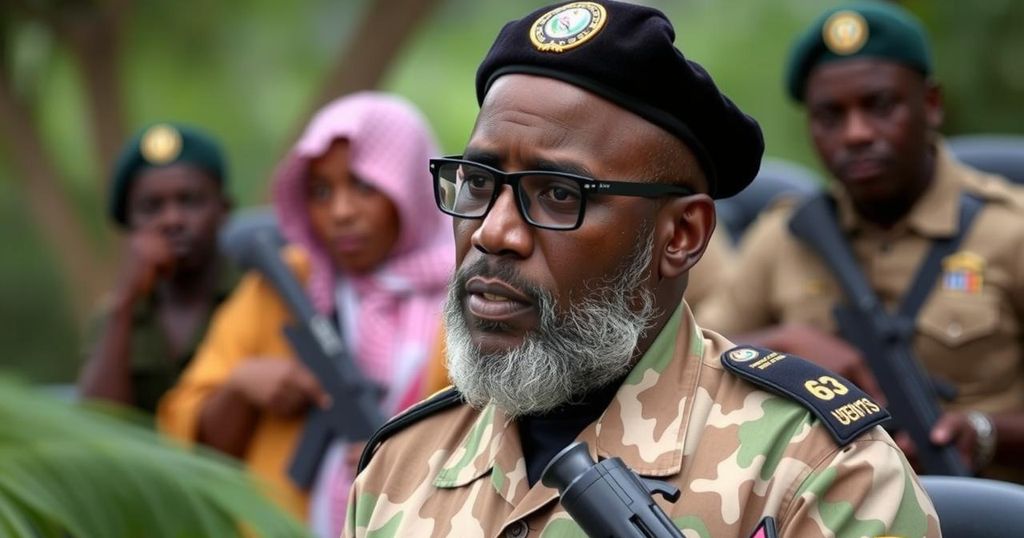Congo Bans Al Jazeera, Threatens Journalists Over M23 Interview

The Congolese government has banned Al Jazeera over its interview with M23 leader Bertrand Bisimwa, claiming it promoted terrorism without proper accreditation. This action underscores the increasing censorship of media in Congo, where officials threatened severe consequences for coverage of rebellion activities. Critics argue this undermines press freedoms and essential reporting on humanitarian issues amid ongoing violence in eastern Congo.
In a significant move, the Congolese government has banned Al Jazeera following the network’s interview with Bertrand Bisimwa, the leader of the M23 rebel group. This action reflects the government’s increasing intolerance towards media coverage that they deem sympathetic to terrorists. Authorities specifically cited the absence of proper accreditation for interviewing a recognized terrorist leader, claiming it undermines national security and public order. Critics, including opposition spokespersons and activists, have condemned the ban as a constraint on press freedoms, expressing concerns about the implications for journalistic integrity in Congo.
The M23 rebel group has been active in eastern Congo, where it recently seized territory, causing significant humanitarian crises including the displacement of over one million people. The Congolese government has long struggled with over a hundred armed factions vying for control in this resource-rich region. In response to the interview, government officials additionally warned journalists against reporting activities related to the M23, with Justice Minister Constant Mutamba hinting at severe consequences for non-compliance. This pervasive negativity towards independent media highlights the ongoing tensions between the Congolese government and journalism in the country, risking an erosion of democratic freedoms.
The political environment in the Democratic Republic of Congo (DRC) remains fraught, characterized by a complex interplay of armed conflicts, governmental authority, and civil liberties. The M23 movement, stemming from regional tensions, particularly with Rwanda, stands out for its historical persistence and military capabilities. The government’s crackdown on media reporting is part of a broader strategy to control narratives surrounding ongoing conflicts, reflecting anxieties over stability and governance. Prominent media organizations, both local and international, have faced increasing scrutiny and regulatory pressure amid these developments, impacting critical discourse on the DRC’s challenges.
“Being patriotic doesn’t mean being government propagandists,” stated Hervé Diakiese, a spokesperson for the opposition. “It’s imperative that we have the information,” remarked activist Jacques Issongo, criticizing the media ban. “Al Jazeera’s interview with Bisimwa was tantamount to an apology for terrorism and totally unacceptable,” asserted government spokesman Patrick Muyaya during a press conference, reinforcing the administration’s stance on media engagement.
This recent decision by the Congolese government signifies a troubling trend towards greater censorship and less tolerance for dissenting voices within the media. As numerous critics highlight the necessity for diverse and informative reporting, the implications of this ban could lead to a stifling of public discourse and crucial narratives surrounding the ongoing strife in eastern Congo. Although the government claims to act in the interest of national security, the restrictions imposed on press freedom evoke fears of authoritarianism and curtailment of freedoms essential to a democratic society.
The Democratic Republic of Congo continues to grapple with a multitude of armed groups, predominantly in its eastern regions. These areas are rich in minerals yet plagued by violence and instability, largely attributed to the historical tensions between various factions and neighboring countries, especially Rwanda. The M23 group, notorious for its military activities, has posed significant challenges to the Congolese government, leading to a humanitarian crisis with countless displaced individuals. The government’s response to media coverage, particularly those that may appear sympathetic to such groups, forms part of a larger narrative that seeks to control information and maintain the status quo amid ongoing conflicts in the region.
In conclusion, the Congolese government’s ban on Al Jazeera and its warnings to journalists reinforce the tension between state authority and freedom of press in a conflict-ridden environment. Such actions raise critical questions regarding media independence and the role of journalism in informing the public about unfolding crises. While the government may argue this is a matter of national security, the implications for democratic freedoms and public discourse remain concerning, suggesting a potential regression in civil liberties and press freedom within the DRC.
Original Source: www.washingtonpost.com






